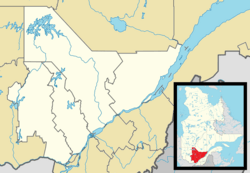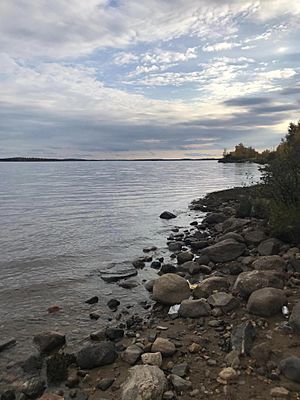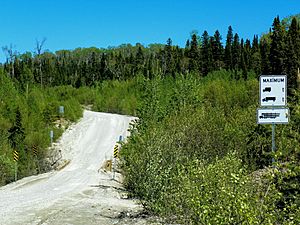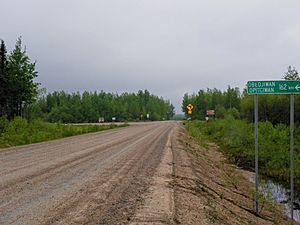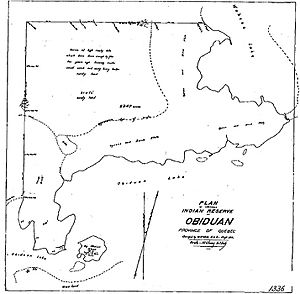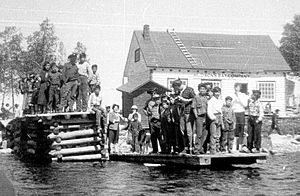Obedjiwan facts for kids
Quick facts for kids
Obedjiwan
Opitciwan
|
|
|---|---|
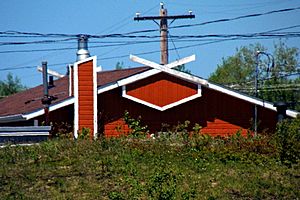
The roof of an Obedjiwan house
|
|
| Country | |
| Province | |
| Region | Mauricie |
| Census division | La Tuque |
| Settled | 1825 (trading post) |
| Formation | March 21, 1950 (reserve) |
| Area | |
| • Total | 9.27 km2 (3.58 sq mi) |
| • Land | 8.26 km2 (3.19 sq mi) |
| Population
(2021)
|
|
| • Total | 1,991 |
| • Density | 241.1/km2 (624/sq mi) |
| Time zone | UTC-5 (EST) |
| • Summer (DST) | UTC-4 (EDT) |
| Postal Code |
G0W 3B0
|
| Area code(s) | 819 |
| Website | www.opitciwan.ca |
Obedjiwan (officially known as Obedjiwan 28) is a special village and reserve for First Nations people. It is located on the north side of the Gouin Reservoir in the Mauricie region of Quebec, Canada. This community is home to the Atikamekw of Opitciwan band, part of the larger Atikamekw Nation.
Contents
Exploring Obedjiwan's Location
The Obedjiwan reserve sits on the northern shore of the Gouin Reservoir. It is about 143 kilometers (89 miles) south of Chibougamau. It is also 118 kilometers (73 miles) north of Wemotaci and 217 kilometers (135 miles) northwest of La Tuque. The reserve is nestled between Lake Kamitcikamac to the west and Wopisiw Bay to the east.
Obedjiwan is quite isolated, surrounded by the City of La Tuque. You can reach it by a long, gravel forest road that stretches for 146 kilometers (91 miles). This road connects to Quebec Route 167, which goes from Saint-Félicien to Chibougamau. Because of these long distances, many people use airplanes to travel to and from Obedjiwan.
Understanding the Name: Obedjiwan
The name Obedjiwan comes from the Atikamekw language. In the official Atikamekw spelling, it is written as Opitciwan. The name combines two parts: oba or obe, which means "strait" or "narrows," and djwan, which means "running" or "current." So, Obedjiwan means "current of the strait" or "running narrows."
Over time, the name has been spelled in different ways. When the Hudson's Bay Company set up a trading post in 1825, they called it Waupatchinauganiskau. Later, in 1871, an explorer named John P. Bignell wrote it as Obidjouan. From 1904 to 1964, the accepted spelling was Obiduan. Other spellings included Obijuan and Wabijiwoine.
A Look at Obedjiwan's History
The area around the upper Saint-Maurice River has always been the home of the Atikamekw people. Lake Obedjiwan, which is now part of the larger Gouin Reservoir, was an important spot. It was located along old canoe routes that connected to Lac Saint-Jean and James Bay. For centuries, even before recorded history, the shores of this lake were a meeting place. Atikamekw people and other Indigenous groups would gather here to trade, socialize, and share their cultures. They traded things like moose and beaver skins for goods like wheat, flour, and even firearms from the Hurons.
In 1825, both the Hudson's Bay Company (HBC) and the King's Posts Company set up trading posts at Lake Obedjiwan. These posts quickly attracted Indigenous hunters from the area and even from distant regions like eastern James Bay. In 1840, the Hudson's Bay Company moved its post away from Lake Obedjiwan to Kikendatch Lake. However, in 1911, the HBC moved its Kikendatch Post back to Lake Obedjiwan. This caused the Atikamekw people to return to the area as well. The HBC wanted to avoid other traders, and the Atikamekw preferred to be away from the growing number of Europeans in the south.
At this time, there wasn't a permanent village. However, the Oblates, a group of missionaries, built a chapel in 1916. It was on the opposite side of the Saint-Maurice River from the HBC Post, separated by the Obedjiwan Narrows.
A big change happened in 1917 when the La Loutre dam was built. This dam created the Gouin Reservoir, which flooded hundreds of lakes, including Lake Obedjiwan. The old settlement and its historical sites were covered by water. It took many years of talks, but a new village was finally built in 1925. This new village is about 3 kilometers (2 miles) west of the old site, where Obedjiwan stands today.
On December 31, 1941, the Quebec Government passed a law to set aside land for Indigenous peoples. On January 14, 1944, an area of about 9.27 square kilometers (2,290 acres) was given by the Government of Quebec to the Government of Canada. This land officially became the "Obiduan Indian Reserve" on March 21, 1950. Its name was later changed to "Obedjiwan Indian Reserve" on January 23, 1964.
Today, the Atikamekw of Opitciwan are working with the government of Canada to address past issues. They are seeking fair compensation for the land and belongings lost when the reservoir flooded their original homes. They also want to resolve the long delay in creating their reserve and its size. These discussions are still ongoing.
Obedjiwan's Population and People
| Canada census – Obedjiwan community profile | |||
|---|---|---|---|
| 2011 | 2006 | ||
| Population: | 2031 (14.0% from 2006) | 1782 (7.0% from 2001) | |
| Land area: | 8.68 km2 (3.35 sq mi) | 8.68 km2 (3.35 sq mi) | |
| Population density: | 234.1/km2 (606/sq mi) | 205.4/km2 (532/sq mi) | |
| Median age: | 20.7 (M: 20.3, F: 21.4) | 21.5 (M: 21.7, F: 21.2) | |
| Total private dwellings: | 463 | 388 | |
| Median household income: | $47,488 | ||
| References: 2011 2006 earlier | |||
Here's how the population of Obedjiwan has changed over the years:
- 2021: 1,991 people
- 2016: 2,019 people
- 2011: 2,031 people
- 2006: 1,782 people
- 2001: 1,666 people
- 1996: 1,464 people
- 1991: 1,125 people
Speaking the Atikamekw Language
The Atikamekw language is very important in Obedjiwan. Most families still speak it as their main language. This means it is one of the Indigenous languages that is least at risk of disappearing. The Atikamekw language shares some similarities with the Cree language, which is spoken by Cree communities in southern Quebec. This might be because the Cree and Atikamekw people have often interacted with each other over time. The second most common language used in Obedjiwan is French.
Here's a breakdown of the main languages spoken:
- English: 0%
- French: 2.5%
- Atikamekw: 97.0%
- Other languages: 0.5%
Images for kids
-
The Gouin Reservoir surrounds the village.
 | Sharif Bey |
 | Hale Woodruff |
 | Richmond Barthé |
 | Purvis Young |


